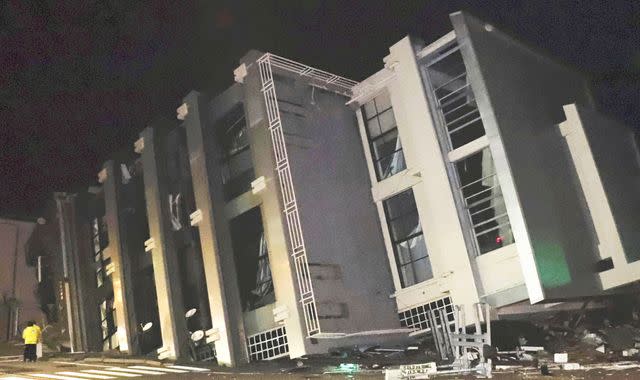Japan earthquake: Tsunami advisory issued after 7.6 magnitude quake hits

Japan has issued a tsunami advisory after a series of strong earthquakes - with almost 100,000 residents ordered to evacuate.
The quakes hit Ishikawa and nearby areas, with one having a preliminary magnitude of 7.6, according to the Japan Meteorological Agency.
Four people have died in today's earthquakes, Kyodo News reported, citing the crisis management team in Ishikawa.
Earlier, Japanese media reports cited local police as saying an elderly man was pronounced dead after a building collapsed in Shika Town in Ishikawa
There are reports of people trapped under the rubble of collapsed buildings and tens of thousands of homes are without power - with people being urged to flee to high ground due to the tsunami threat.
Japan earthquake latest: Major tsunami warning as residents urged to evacuate
It was the strongest quake in the region in more than four decades, according to the US Geological Survey, and resulted in the first major tsunami warning since 2011.
The meteorological agency initially issued a major tsunami warning for Ishikawa, but this was later downgraded to a regular tsunami warning and then a tsunami advisory several hours later.
The warning had been issued for Ishikawa and nearby prefectures, along with other low-level warnings for the rest of the western coast of the island of Honshu.
A tsunami over 1.2m high struck Noto in Ishikawa, a spokesperson said.
They added there was a risk of fires, houses collapsing and landslides in areas hit by strong quakes and urged members of the public not to return to dangerous areas for at least a week.
At least 30 buildings in Ishikawa have collapsed so far, a local fire department in Wajima City said.
Waves up to 3m predicted
Waves up to 3m high were predicted, according to Japanese broadcaster NHK, which urged people to flee to high ground or the tops of nearby buildings as quickly as possible.
It warned tsunami waves could keep returning and warned more strong quakes could occur in the area over the coming days. More than 80 earthquakes rocked the region.
The broadcaster initially warned the waves could reach up to 5m tall.
Residents urged to evacuate
Japan's Prime Minister Fumio Kishida urged residents facing the tsunami threat to evacuate immediately following the earthquake.
"Residents need to stay on alert for further possible quakes and I urge people in areas where tsunamis are expected to evacuate as soon as possible," he said.
Government spokesman Yoshimasa Hayashi said it was critical for people in coastal areas to get away from the oncoming tsunami.
"Every minute counts. Please evacuate to a safe area immediately," he said.
'We haven't decided when to return home yet'
In Kanazawa, a popular tourist destination in Ishikawa, local resident Ayako Daikai said she had evacuated to a nearby school with her husband and children soon after the earthquake hit.
She told Reuters that classrooms, stairwells, hallways and the school gymnasium were all packed with evacuees.
"I also experienced the Great Hanshin Earthquake, so I thought it would be safest to evacuate," she said. "We haven't decided when to return home yet."
No irregularities reported at nuclear plants
Nuclear power plants in the area had not reported any irregularities, Japan's Nuclear Regulation Authority said.
More than 36,000 households lost power in Ishikawa and Toyama prefectures, utilities provider Hokuriku Electric Power said.
High speed rail services to Ishikawa have been suspended while Japanese airline ANA turned back planes headed to airports in Toyama and Ishikawa and Japan Airlines cancelled most of its services to Niigata and Ishikawa regions.
Tsunami could last for days
The tsunami could last for two days, an expert said. The secretary general of the Joint Tsunami Commission, Mohammad Heidarzadeh, told Sky News the natural disaster has the potential to create "long-lasting oscillations" due to its location in the Sea of Japan - an almost entirely enclosed basin.
"This means that for two days you could have large waves and then obviously an impact on countries on the other side like North Korea, South Korea, Russia," he said. "We are just at the beginning of a disaster, I would say."
Russia and North Korea issue tsunami warnings
Russia issued a tsunami warning for parts of Sakhalin island's western coast and the mainland cities of Vladivostok and Nakhodka, which are situated close to Japan on Russia's east, while North Korea issued tsunami warnings for its east coast.
Waves 1m high reached South Korea's east coast, with its meteorological agency adding there may be more and larger waves in the coming hours.
Japan is extremely prone to earthquakes. In March 2011, a major quake and tsunami caused meltdowns at the Fukushima nuclear power plant.

 Yahoo News
Yahoo News 
